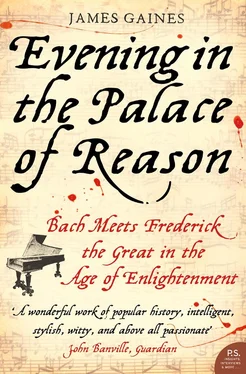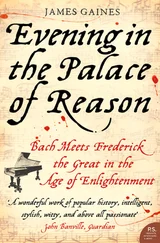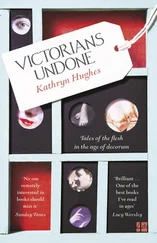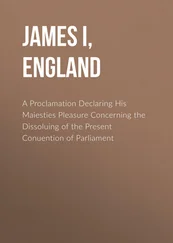Evening in the Palace of Reason
BACH meets FREDERICK THE GREAT
in the AGE OF ENLIGHTENMENT
JAMES GAINES
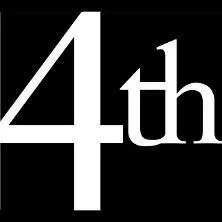
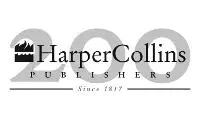
Fourth Estate
An imprint of HarperCollins Publishers Ltd. 1 London Bridge Street London SE1 9GF
www.harpercollins.co.uk
First published by Fourth Estate 2005
Copyright © James Gaines 2005
PS section copyright © Louise Tucker 2005, except
‘How I Came to Write This Book’ by James Gaines © James Gaines 2005
PS™ is a trademark of HarperCollins Publishers Ltd
James Gaines asserts the moral right to be identified as the author of this work
Cover images: Lebrecht Music and Arts Photo Library
A catalogue record for this book is available from the British Library
Portraits of Johann Sebastian Bach and Frederick the Great © Bettman/CORBIS
All rights reserved under International and Pan-American Copyright Conventions. By payment of the required fees, you have been granted the nonexclusive, nontransferable right to access and read the text of this ebook on-screen. No part of this text may be reproduced, transmitted, downloaded, decompiled, reverse engineered, or stored in or introduced into any information storage and retrieval system, in any form or by any means, whether electronic or mechanical, now known or hereinafter invented, without the express written permission of HarperCollins ebooks
HarperCollins Publishers has made every reasonable effort to ensure that any picture content and written content in this ebook has been included or removed in accordance with the contractual and technological constraints in operation at the time of publication
Source ISBN: 9780007153930
Ebook Edition © JULY 2014 ISBN: 9780007369461
Version: 2017-08-15
From the reviews of Evening in the Palace of Reason :
‘A wonderful work of popular history, intelligent, stylish, wryly witty, serious yet never solemn, and above all passionate’
JOHN BANVILLE, Guardian
‘Wonderfully engaging … a piece of theatre that is witty, instructive and often bizarre … It is a book that is almost impossible to put down when one is dancing, swerving, stumbling through the extraordinary brilliance, blood-thirst, cruelty, fecundity and religious and other feuds of the society that helped to inspire Bach and sustain Frederick’
Independent on Sunday
‘Gaines’s style is readable, crisp and compelling. He is an excellent guide: informed, unpretentious and frank … The impressive research is lightly worn … The minor parts are well played: Voltaire, Handel, Maria Theresa and George II all contribute beautifully drawn cameos. The reader retains a strong sense of their deeper and more complex historical characters. Above all, the musical prose is first-rate. Gaines is thoroughly acquainted with the repertoire, and his ability to convey a sense of Bach’s unique sensibility and spiritual power is often remarkable … A story told with wit, knowledge, the odd flight of fancy, and love’
Times Literary Supplement
‘James Gaines vividly brings to life the personalities involved … [A] dramatic story, told with great pace and gusto’
Scotland on Sunday
FOR ALLISON, NICK ,
WILLIAM, AND LILLIAN
Cover
Title Page
Copyright
Praise
Dedication
Map
I. THEME FOR A PAS DE DEUX
II. BIOGRAPHY OF A TEMPERAMENT
III. THE HOHENZOLLERN REAL ESTATE COMPANY
IV. A SMALL, UNREADY ALCHEMIST
V. GIANTS, SPIES, AND THE LASH: LIFE WITH “FATTY”
VI. THE SHARP EDGES OF GENIUS
VII. WITNESS TO AN EXECUTION
VIII. SONG OF THE ENDLESSLY ORBITING SPHERES
IX. A CHANGELING AMONG THE SWANS
X. THE ARTIST IN A PAINT-BY-NUMBERS WORLD
XI. WAR AND PEACE AND A MECHANICAL DUCK
XII. THE NIGHT OF A MUSICAL OFFERING
XIII. AFTERLIVES: AN EPILOGUE
P.S. Ideas, Interviews & Features …
About the Author
A Passion for Thought
Life at a Glance
A Writing Life
Top Ten Books About Back
About the Book
How I Came to Write This Book by James Gaines
Read On
Have You Read?
If You Loved This, You Might Like …
Find Out More
Notes On Sources
A Selected Bibliography
A Very Selective Discography
A Glossary of Musical Terms
Index
Acknowledgments
About the Author
By the Same Author
About the Publisher
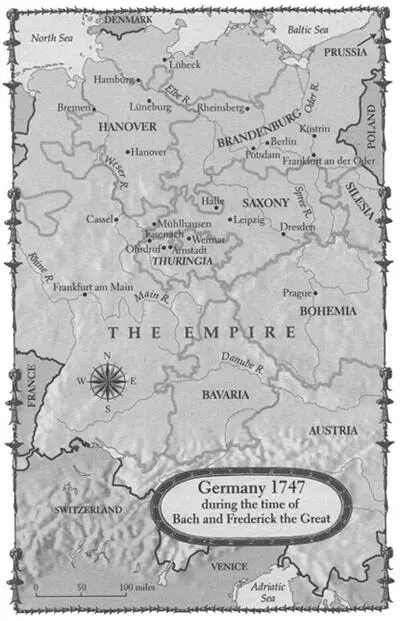
I. THEME FOR A PAS DE DEUX
FREDERICK THE GREAT HAD ALWAYS LOVED TO PLAY the flute, which was one of the qualities in him that his father most despised. Throughout his youth, Frederick had to play in secret. Among his fondest memories were evenings at his mother’s palace, where he was free to dress up in French clothes, curl and puff his hair in the French style, and play duets with his soulmate sister Wilhelmina—he on the flute he called Principe , she on her lute Principessa . When Frederick’s father once happened unexpectedly on this scene, he flew into a rage. Even more than his son’s flute playing, Frederick William I hated everything French—French clothes, French food, French mannerisms, French civilization, all of which he dismissed as “effeminate.” He had of course been educated in French, like most German princes (he could not even spell Deutschland but habitually wrote Deusland ), so he had to speak French, but he hated himself for it. He dressed convicts for their executions in French clothes as his own sort of fashion statement.
In this regard and others, Frederick’s father was at least half mad. Flagrantly manic-depressive and violently abusive, he also suffered from porphyria, a disease common among descendants of Mary Queen of Scots (which he was, on his mother’s side). Its afflictions included migraines, abscesses, boils, paranoia, and mind-engulfing stomach pains. The rages of Frederick William were frequent, infamous, and knew no rank: He hit servants, family members (no one more than Frederick), even visiting diplomats. Racked by gout, he lashed out with crutches, and if the pain was bad enough to put him in his wheelchair, he chased people down in it brandishing a cane. He was infamous for his canings—he left canes in various rooms of the castle so they would always be close at hand—but he also threw plates at people, pulled their hair, slapped them, knocked them down, and kicked them. A famous story has him walking down the street in Potsdam and noticing one of his subjects darting away. He ordered the man to stop and tell him why he ran. Because he was afraid, the man said. “Afraid?! Afraid?! You’re supposed to love me!” Out came the cane and down went the subject, the king screaming, “Love me, scum!” Such a rage could be sparked by the very word France .
Читать дальше
